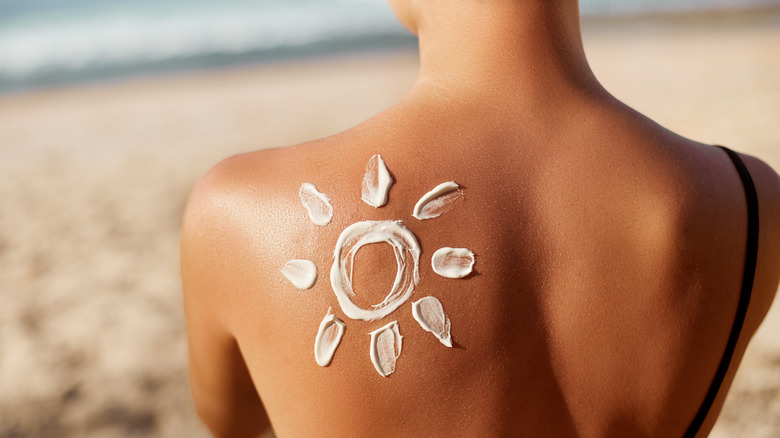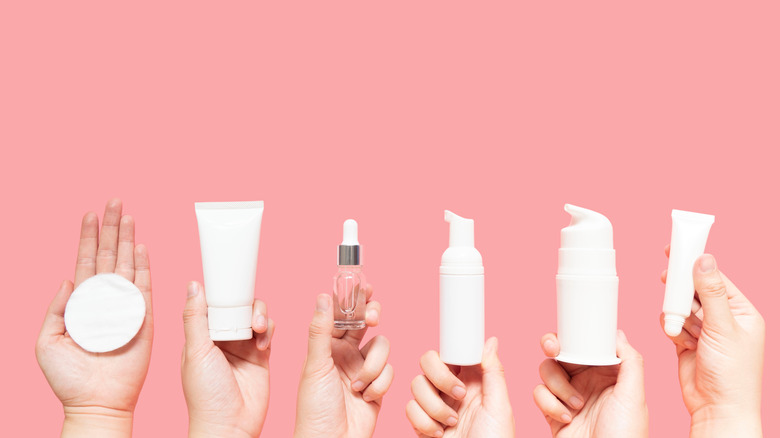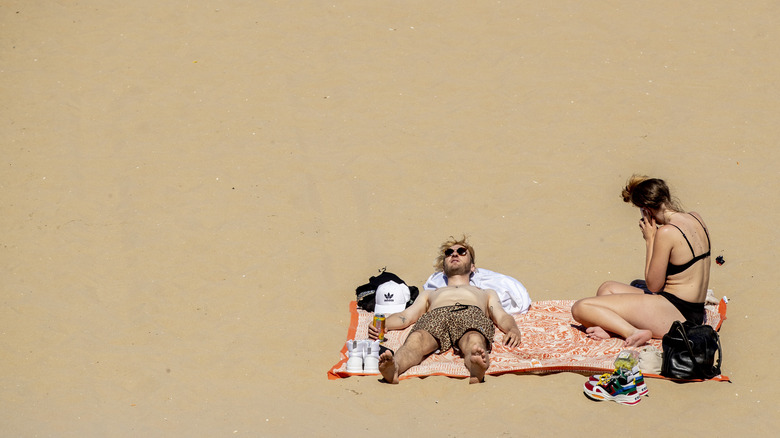When You Wear Makeup While Tanning, This Is What Happens
Summertime is exciting! Who doesn't love devouring ice cream, rocking summer hats, and heading to the beach? But before you pack your bathing suit to hit the waves, it's always a good idea to know how your body will react to sun exposure.
The sun radiates two types of rays — ultraviolet A (UVA) rays and ultraviolet B (UVB) rays (via University of Iowa Hospitals & Clinics). The UVB rays burn the epidermis (the outermost layer of the skin), causing sunburn. On the other hand, the UVA rays penetrate deeper into the epidermis and result in the tanning of the skin.
When the UVA rays penetrate the epidermis, they produce melanin — the brown pigment that causes tanning. Melanin is created when the UVA rays trigger the melanocytes (melanin-producing cells). The body's defense against burning results in melanin production (via TeensHealth). People with darker skin tones tend to tan more deeply since their bodies produce more melanin than people with lighter skin tones.
Is wearing makeup a good idea while tanning?
Wearing makeup can have several effects on your face if you choose to tan with it on. For example, your skin might tan differently depending upon what type of makeup you're wearing and whether or not it contains SPF or UV protection. Also, in some cases, you might tan unevenly if you have makeup on. If it's really hot out, sweating may be inevitable.
But there's more to makeup than coating the skin, as makeup cannot replace SPF. Mascara, foundation, blush, eye shadow, and lipstick, even when combined, cannot play the role of sunscreen and protect the skin against harmful rays. The reason for this? Your skin is still exposed to UV radiation even with makeup on, which can cause sunburn, skin damage, and in extreme cases, even skin cancer (via TeensHealth).
It's never a good idea to entirely replace sunscreen with makeup, although some medical experts believe that it can help serve as a protective barrier. Researcher Dr. Artemi tells Metro, "We can advise that functional colored cosmetics should be added to long-standing advice to further reduce the risk of skin cancer and premature aging, as well as protecting against the increasing danger of air pollution." However, makeup can only prove beneficial to the skin while tanning if it is coupled with sunscreen. According to the American Academy of Dermatology, you need to apply sunscreen every two hours, even on cloudy days.
Make sure your makeup products have this ingredient
So while some research shows that the makeup layer may provide additional protection to the skin against UV rays, some skin specialists think this might not be the case.
According to facialist Kate Kerr, the effect of makeup on the skin depends entirely upon the formula being used (via Metro). For example, an SPF formula will prove beneficial for protecting the skin. In contrast, a standard formula might aid in damaging the skin.
Kerr further explains, "Liquid foundations sit on the skin's surface, which can be a problem in the sun, as they will prevent your sweat from flushing out the cell debris within the pore.” Makeup can also cause skin congestion and clog your pores which traps bacteria. This can result in breakouts.
So the next time you plan on enjoying the outdoors, make sure that you have your sunscreen on, or are at least wearing makeup products with sunscreen properties.



